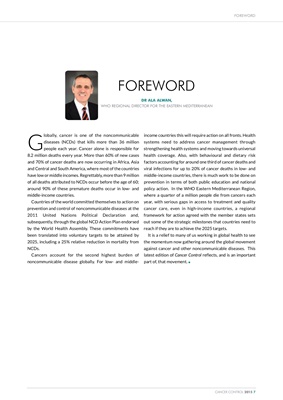
FOREWORD
CANCER CONTROL 2015 7
G
lobally, cancer is one of the noncommunicable
diseases (NCDs) that kills more than 36 million
people each year. Cancer alone is responsible for
8.2 million deaths every year. More than 60% of new cases
and 70% of cancer deaths are now occurring in Africa, Asia
and Central and South America, where most of the countries
have low or middle incomes. Regrettably, more than 9 million
of all deaths attributed to NCDs occur before the age of 60;
around 90% of these premature deaths occur in low- and
middle-income countries.
Countries of the world committed themselves to action on
prevention and control of noncommunicable diseases at the
2011 United Nations Political Declaration and,
subsequently, through the global NCD Action Plan endorsed
by the World Health Assembly. These commitments have
been translated into voluntary targets to be attained by
2025, including a 25% relative reduction in mortality from
NCDs.
Cancers account for the second highest burden of
noncommunicable disease globally. For low- and middleincome
countries this will require action on all fronts. Health
systems need to address cancer management through
strengthening health systems and moving towards universal
health coverage. Also, with behavioural and dietary risk
factors accounting for around one third of cancer deaths and
viral infections for up to 20% of cancer deaths in low- and
middle-income countries, there is much work to be done on
prevention in terms of both public education and national
policy action. In the WHO Eastern Mediterranean Region,
where a quarter of a million people die from cancers each
year, with serious gaps in access to treatment and quality
cancer care, even in high-income countries, a regional
framework for action agreed with the member states sets
out some of the strategic milestones that countries need to
reach if they are to achieve the 2025 targets.
It is a relief to many of us working in global health to see
the momentum now gathering around the global movement
against cancer and other noncommunicable diseases. This
latest edition of Cancer Control reflects, and is an important
part of, that movement. l
FOREWORD
DR ALA ALWAN,
WHO REGIONAL DIRECTOR FOR THE EASTERN MEDITERRANEAN